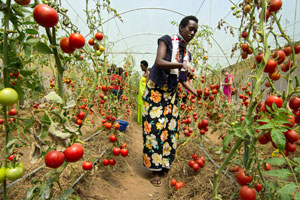In Rwanda, Executive Director gains insight into greenhouse agriculture Kinazi, Rwanda
Date:
The singing rolls down the hillsides: Dressed in colourful, traditional dresses, the 20 women raise their voices to welcome the Executive Director of UN Women, Phumzile Mlambo-Ngcuka as she arrives in Kinazi in southern Rwanda on 22 May.

Women’s rights have gradually improved in Rwanda, with women reaching an unprecedented 63.8 per cent of Rwanda's parliament in September 2013. Still, there is a need to strengthen women’s access to work for a sustainable wage, and ability to build their own businesses.
UN Women partners with Terimbere Mutegarugori, a cooperative bringing together 93 women from various backgrounds to enable them to financially support themselves and their families. This group is just one of 11 cooperatives that are supported through the Imali Project, meaning “wealth.” Currently, the groups are being given seed money and training in income-generating activities, particularly the increase of tomato and mushroom production.
As Ms. Mlambo-Ngcuka visits the greenhouse, scanning the long rows of red tomatoes, soon to be sold at market, Patricie Ntashamaje, an Imali cooperative member says: “The Imali project has changed our lives. We did not have much money before, but now we even have savings. One of the best things [about this project] is that we work together and try together to improve the lives of those around us.”
By providing health insurance, paying school fees for member’s children, as well as paying for Technical and Vocational Training, the lives of the cooperative’s members have improved in just two years of operation. The group has purchased livestock and has assisted cooperative members in extending their cassava production. In addition to the investments, the group has also started a savings account for an additional greenhouse. Overall, 700 members from the various cooperatives participate, and are contributing to an even brighter future.
On her tour of the cooperative’s worksite, along with members of the local government, Ms. Mlambo-Ngcuka leaves her prepared speech behind to speak directly to the members.
“Ultimately, you create your wealth and you allow UN Women to be your support system,” she said. “I am glad to see men and women working hand-in-hand, as we should never forget the role of men in the empowerment of women. And we should also remember the other cooperatives and the 11 greenhouses spread throughout Rwanda. Together you can create a critical mass and take charge of the market. I want to be able to go anywhere in the world and eat a tomato from Imali.”
Before leaving Kinazi, Ms. Mlambo-Ngcuka asks the women to invest in the education of their girls and boys – the girls in particular – but never to leave the boys behind.
This project is financed through core funding to UN Women, from the Government of Korea and in partnership with the Imbuto Foundation.